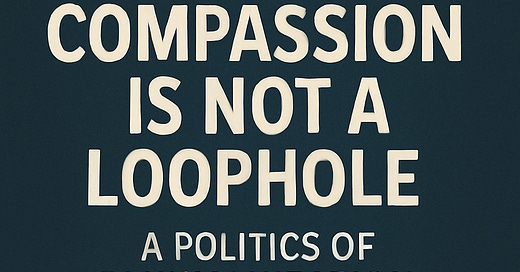CH 12 - Compassion Is Not a Loophole
From Criminal by Design: The Architecture of Harm in U.S. Immigration
Listen to the podcast
Return to the Criminal by Design: The Architecture of Harm in U.S. Immigration Hub
Since when did caring become a crime?
In today’s immigration discourse, compassion is no longer seen as a virtue. It’s treated as a weakness. Worse—it's labeled a loophole.
Humanitarian aid is now framed as enabling. Volunteer networks are watched. Faith-based groups offering shelter or water are investigated. Attorneys are demonized. Even clergy have been charged.
"We didn’t close the border to criminals. We closed it to compassion."
When Helping Is Called Criminal
Across the country:
Aid workers have been arrested for leaving food and water in the desert
Churches and mosques offering sanctuary have been surveilled
Doctors and lawyers face threats for defending basic rights
In 2019, Scott Warren of Arizona faced 20 years in prison for providing food, water, and shelter to two migrants in the desert. His case was dismissed—but only after two trials and national outrage.
“The government wasn’t punishing human smuggling. They were punishing human kindness.”
Meanwhile, ICE agents routinely operate outside the law—lying about warrants, ignoring court orders, and ambushing families. But those who speak out against it are the ones labeled subversive.
The Moral Inversion
The political narrative has shifted:
Empathy is weakness.
Aid is manipulation.
Advocacy is an agenda.
This inversion of values allows cruelty to masquerade as policy. It justifies separating families, deporting the sick, and abandoning children—not as failure, but as strength.
But let’s be clear:
Following your conscience is not subversion.
Upholding human dignity is not lawlessness.
Caring for strangers is not a crime—it’s a command.
“If we criminalize compassion, what kind of society are we trying to build?”
THX Breakdown — When the System Devalues Empathy
Utilities denied:
Emotion Evoked: Fear replaces trust
Support: Helpers are isolated, not backed
Security: Those who offer care are made unsafe
PERMAH failure:
Meaning: Compassion is punished, not honored
Positive Emotion: Drowned out by fear-mongering
Relationships: Polarized instead of strengthened
Admiration Equation betrayal:
No Goodness in punishing those who serve
No Gratitude for those who fill the gap the system refuses to
No Awe in standing with the vulnerable
“We admire courage—until it challenges our politics.”
Final Reflection and Challenge
This isn’t about open borders. It’s about open hearts.
You don’t have to agree on every policy to ask: When did we start fearing the helpers more than the harm?
“Compassion is not a loophole. It is the last thread holding our humanity together.”
Call to Action: Share this with someone who thinks caring ‘enables illegality.’ Ask them: If they were in danger, wouldn’t they pray someone still believed in kindness?
NEXT - CH13: Redesigning the System
What a Just Immigration Policy Could Look Like
A better system isn’t just possible. It’s overdue.




